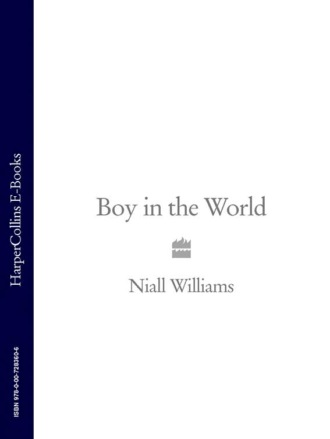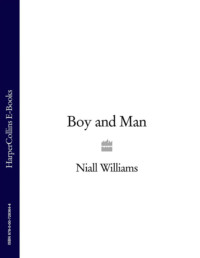
Полная версия
Boy in the World
‘Looks fine.’
‘Good, good.’ The Master crossed to the television where the news channel the boy liked to watch was reporting latest trends in world terrorism. He switched it off. ‘Enough of that,’ he said, ‘come on.’ They went outside and got into the small yellow car and drove towards the village.
It was a blue May day, the countryside they passed full of the beginnings of summer: hedgerows sprinkled with the small white blooms of blackthorn and the blaze of yellow gorse, meadows already green and grass thickening. Soon farmers would be out in tractors and morning, noon and early night would fill with the sound of mowers. The village was not far away and as they arrived at the top of its one long street there were cars parked everywhere and at all angles, as if abandoned. Banners of small triangular flags had been hung between the lamp-posts to signal the Confirmation Day and to welcome the bishop.
‘We’re a tiny bit late,’ the Master said, ‘but never mind,’ he added, noting a look of concern on the boy’s face. ‘I’m the Master, they can’t start without me.’
The boy did not say anything.
‘You all right?’ The Master patted him on his shoulder. ‘Honestly you’ll be fine. Absolutely fine.’
He stopped in the middle of the street and then began to reverse into the smallest of spaces between two cars, but as he did the engine coughed and died. The Master shrugged. ‘Well, made it this far,’ he said to the old car, and got out to hurry up the street.
Inside the church the choir was already singing. The parents of children from the Master’s school exchanged looks of disapproval when he at last arrived. He smiled and was making a small wave at his seven sisters-in-law when the bell was rung on the altar and all stood. Mrs Conway on the organ pounded out the notes and made a jerking motion of her head, so that verse by verse her pink glasses edged further down her nose. The small timid figure of Father Paul came out; to hide his terror of the bishop, he wore a curve of smile freshly glued.
The bishop was a large man who loved himself completely. His fine black helmet of hair he considered magnificent, his nose straight, his teeth blanched and fearsome, his great girth symbolic. There was more of him than of most people.
The choir sang. The little church was hot with people, with the hundred candles and the pride of the parents. The first prayers passed over the boy, and soon he was standing and kneeling with others of his classmates but in a kind of dream. The whole event was unreal, as though he were watching it on the television, or had opened the door and come inside a theatre where a play was going on and everyone was involved except him. Everyone but him knew the lines. Or, they didn’t even see him. He wasn’t even there. There was just this new shirt and tie and new trousers and polished shoes in his place.
Over the weeks of preparation and drilling, the many visits the class had made down to the church, the boy knew what followed what. He knew like clockwork how the ceremony was to go, how first there was the Mass and then inside it as it were was the actual Confirmation when the boys and girls would step out of the church pews and go in line up to the bishop. He knew there were some in his class who were terrified of this. There were some whose mothers and fathers, for what reasons he was not sure, had told them horror stories from their own childhood. Had told them of bishops who smacked children hard across the face sending them spinning like tops. Bishops who asked impossible questions just to watch the humiliation burning the cheeks of the poor unfortunates. Bishops with waxy skin and hedgehog moustaches. Bishops with teeth that whistled. Bishops who smelled like burnt sausages. And when Father Paul had come to talk to the class about the Confirmation and its meaning he was a priest who was so unsure of himself, who seemed terrified that he might say the wrong thing, that he spoke in whispers. To the best that most of them could understand he had told them that after Confirmation they were all going to be soldiers.
The Master had told the boy no such tales. Rather when the boy had asked him one evening he had spoken of Confirmation as a rite of passage. ‘It’s a kind of gateway,’ he said, ‘between boyhood and manhood.’
‘Other religions have them too.’
‘They do,’ agreed the Master. ‘In the Jewish religion they have the Bar Mitzvah.’
‘The Hindus have a ceremony too. The native Americans used to have one.’
‘That’s right. Jumping across fires, I seem to recall,’ the Master said. ‘The main point is it marks something. I suppose it’s the beginning of becoming who you are. There’s nothing at all to be afraid of.’
Now, as the actual ceremony continued, the boy was not frightened at all. But there was an unease gathering inside him. Something was wrong. For no reason at all he kept thinking about one of the prayers, the Creed, and its opening line, ‘I believe in one God.’ He had said it a hundred times, maybe more. But only now, at that very moment, did he ask himself if this was what he believed. Suddenly it seemed such a huge thing to him, such a declaration. Did he even believe he had a soul? Did he believe such a thing existed? Or had a separate life longer than his? That even then as he sat there in the church it was inside him? That somewhere his mother’s soul floated?
Meanwhile the Offertory had come and gone, the gifts had been carried up. On the altar the bishop had slurped back the wine and grimaced a little at the inferior quality they used in the country village. All had proceeded with the strange order and precision of a familiar dream.
Only it was not a dream.
There was a sudden rustling of movement and now the boys and girls were standing and moving out along the bench to stand in the aisle. One girl with blonde curl-ironed hair, impatient at the immaturity of a boy in front of her who insisted on walking on the narrow kneeler as if it were a pirate’s gangplank, shoved him in the back, and the whole line tottered forward. In the aisle they stopped and waited. Mrs Conway on the organ gathered steam. The Under-Tens Choir stood and battled against the mighty volume, singing as if they were sucking sour-pops. The parents leaned forward anxiously. Some fathers, elbowed that it was now time, stepped shyly into the aisle with video cameras, each one vying for a slightly better angle.
The line stood and waited. There was a music cue when they were to walk. They were to keep their eyes down. The bishop was to get up and come forward. It was practised a hundred times. One by one they would be confirmed and return to their rows while the video cameras rolled.
The Master had no camera. He watched the boy get out into the aisle, and tried to wink to him but the boy wasn’t looking.
The Under-Tens reached the final chorus and the boys and girls heard their music cue to move. The bishop gave two little forward rolls and managed to rise. He moved forward with a kind of majesty, as if he imagined himself a king and the crowd cheering. Down one step, down another and forward towards the altar rails. Behind him, almost unseen, came the small crouched-over and smiling figure of Father Paul.
One by one the children stepped forward. The boy was thirteenth in the line. Already some were coming back down the aisle.
Were they confirmed now? Did they look any different?
Faith full. Faith filled.
Soldiers. Soul jeers.
Stoppit. Concentrate. I believe.
I believe in … NO!
There was no way the boy could have known beforehand, no way that he could have realized earlier and saved himself and the Master the embarrassment that was soon to follow. And perhaps it was just then, while Mrs Conway played a solo on the organ, her whole upper body swaying back and forth and her glasses slipping ever closer to the end of her nose, that the boy realized he couldn’t continue. Perhaps it was only the motion of the line itself as it got smaller and smaller and he moved nearer and nearer to the bishop.
All he knew was a heat along his collar. Then a sense that his shoes were full of warm water, that he was finding it hard to take the next step. Then the heat under his collar was rising and his breath was growing shorter and the panic of his drowning was ever more real.
Then suddenly the bishop was standing directly in front of him.
He was enormous.
‘My son,’ he said, and his fried breath travelled across to the boy. He had a pink palm raised and in its creases the boy could see glistenings of sweat. The bishop’s eyes bulged. His lips he moistened with the tip of his tongue and then opened his mouth to proceed.
Know. No. I believe. St.
No.
‘No, stop,’ mumbled the boy.
The bishop ignored him.
‘Stop!’ said the boy much louder.
And then everything did. The bishop froze, his eyeballs huge, his mouth open. Above in the organ loft Mrs Conway stopped playing. There was a groan of sound out of the organ, a gasp, and then nothing. The church breathed in. Candles danced. There was a moment of absolute silence, as though a grave announcement had been made.
Through the congregation then there began the wave of response in which the Master’s and the boy’s names were whispered. From around the back of the bishop, Father Paul’s small face appeared, his smile loosening in panic.
‘I can’t,’ said the boy in a quiet voice. He said it only once, but his two words were repeated over and over as they were murmured back among parents and relatives, making a rustling like leaves in a sudden breeze.
‘He can’t.’
‘He can’t.’
‘Shsh.’
‘What?’
‘He said he can’t.’
The bishop was not about to have the Confirmation disturbed. The boy was foolish, or nervous and foolish, or stupid and nervous and foolish, and didn’t know what he was doing or saying. These little hiccups in the ceremony could be overlooked. He could just carry on, he decided, as if nothing had happened. But he needed to do so quickly, because there was whispering in his church now. The rule of his majesty was under threat. He raised the sweat-glistening palm to the boy and placed it on his shoulder. ‘Now my son,’ he said.
But the boy stepped away from him.
‘No!’ he said.
The bishop made a little grasp as if the unconfirmed child was a slippery thing about to get away, but the boy pushed off the hand. He turned to where all were watching, his face burning brightly, his eyes like coals, and he ran down the centre of the aisle and out of the church.
Конец ознакомительного фрагмента.
Текст предоставлен ООО «ЛитРес».
Прочитайте эту книгу целиком, купив полную легальную версию на ЛитРес.
Безопасно оплатить книгу можно банковской картой Visa, MasterCard, Maestro, со счета мобильного телефона, с платежного терминала, в салоне МТС или Связной, через PayPal, WebMoney, Яндекс.Деньги, QIWI Кошелек, бонусными картами или другим удобным Вам способом.



